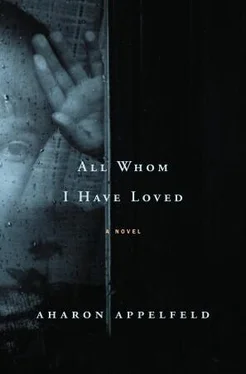On our way back from the Prut, he met a friend from the orphanage. Father was glad to see him and immediately invited him to a café. A short, thin man, he was named Eddy. For years, since his youth, Eddy had worked at Frost's — a general store notorious for the ill treatment of its employees. He had tried other shops, but it hadn't worked out, and now he was thinking of emigrating to America.
“You're doing the right thing.” Father spoke in a loud voice.
“For the time being, I'm saving for a ticket.”
Father told him about Bucharest, about the exhibition, and about the anti-Semites swarming around everywhere.
“I can't imagine a world without anti-Semites.” Eddy spoke in a clear but weak voice.
“I must have deluded myself all these years,” said Father, imitating Eddy's voice.
“I don't even think about them.”
“Why?”
“They're part of nature; apparently there's nothing to be done.”
“And that's how it will always be?”
“That's how it seems to me,” said Eddy, and shrugged like a child.
Father was stirred by his words, embraced him, and repeated over and over: “It's good I met you. How many years has it been since I've seen you? You haven't changed at all, Eddy.”
“A pity that I can't change.”
“Why do you say that?”
“A man has to change.”
“You've already decided you're emigrating, and that's good.”
“It's too late, my friend.”
I noticed something: the skin on his fingers was transparent, and you could see his veins pulsing underneath. When he said, “It's too late, my friend,” a look of wonder filled his large right eye.
Then Father asked about the store and its owner, and about Eddy's friends at work. Eddy replied at length, and Father, who is usually impatient, did not interrupt him. He questioned him in great detail, and Eddy answered in the same detail.
“And you?” Eddy suddenly raised his head.
“I'm going to Storozynetz. Henia — we no longer live together — has come down with typhus and is in the hospital.”
Eddy lowered his head as if he was embarrassed that he had asked. Father added, “Henia worked at the primary school in Storozynetz. She's a dedicated teacher and was very highly thought of.”
“May God make her well again,” Eddy said in a voice that surprised Father.
“I see you're religious.”
“Insofar as I can be.”
“Strange,” said Father, a smile cracking the corners of his mouth.
“Why strange?”
“We didn't have fathers to teach us.”
“We did, only we didn't have the privilege of seeing them.”
“I didn't know that you're religious,” Father said again in a tone of wonder.
“I keep as much as I can,” said Eddy without looking at us.
“As for me,” Father confided to him, “I feel much closer to Christian rituals than to Jewish ones. Surely you remember how, at the orphanage, they would force us to pray. I couldn't stand the way we were forced.”
“I also couldn't stand it,” said Eddy in a quiet voice.
“And on Shabbos they didn't let us leave the yard.”
“You remember, I see.” Eddy laughed, and his large right eye filled his entire face.
Darkness began to fall. Father got to his feet and said, “We have to hurry to the train. It leaves at eight o'clock.” Eddy, who had sat there hunched over the entire time, also got up. Now I saw clearly how thin and short he was, as if his orphanhood had not left him. Father took some banknotes from his wallet, held them out to Eddy, and said, “That's from me toward your ticket to America.”
“What's with you?” said Eddy, stepping back.
“It's nothing.”
“I won't take it.”
“I beg you to.”
“I can't.”
“You must take it,” said Father in a tone that shocked me.
“And if I don't travel to America?” said Eddy in a different tone of voice.
“Then you'll give it back to me.”
Father had apparently put him on the spot, and Eddy seemed frozen in place. He stood there in silence, his head bent, and then he began to cry. At first it looked like he was shedding only a few tears, but the longer he stood there, the more the weeping spread throughout his body, making his shoulders shake.
“Forgive me,” said Father, and slipped the banknotes back into his coat pocket.
“ You have to forgive me; I've refused your generosity.”
And so they parted. Father and I headed down to the station, and Eddy turned and went on his way. Father tried to explain it all to me, but I didn't understand anything he said. I felt that Eddy's refusal to accept his money had hurt him. As always after a hurt, Father raised his collar and buried his head inside it.
We missed the eight o'clock train and waited at the snack counter for the one departing at midnight. Father read a newspaper, lighting one cigarette from another. A cold night already crouched over the empty platforms. Here and there a porter could be seen dragging a bag or a suitcase. The warehouses alongside the platforms were locked with wide iron bars, and dim light rested on the protruding windowsills. I suddenly felt so sorry for Father that I touched his hand.
“What is it, dear?” He turned to me apprehensively.
“Nothing, Father.”
I saw how his speech had become muted and his cheeks sunken. People came and went, but there were no familiar faces among them.
After an hour and a half 's delay, the train arrived. The car was cold and empty. The suitcase and the duffel bag seemed small next to the seats, as if they had shrunk. Father wrapped me in a sweater and took off my shoes. The lights from the lamps came through the windowpanes, laying squares of light on the floor.
“Are you cold?” Father asked in a whisper.
“No.”
“In three and a half hours we'll be in Storozynetz.”
The words echoed through the empty car and then vanished. Father took a few swigs from his flask, and a groan escaped him. I again saw Eddy, from whom we had parted only a short while earlier. His large right eye was spread over his face, as if it was trying to hide his soul. Now I understood: Eddy had not cried over Father's fate but over himself and his own life, which had not changed since he had left the orphanage.
I was awake. The wide car was full of shimmering shadows that heightened my alertness and overwhelmed me.
Later I fell asleep, and I saw Mother emerging from brackish water. It was similar to what I had seen in the sum-mer — the river flowed in the same direction, and the water was black and viscous.
“Mother!” I called.
“What is it, my dear?” she said, and the black water flowed away from her. Some water stains clung to the upper part of her body.
“Mother, please take away those stains.”
“It's nothing,” Mother said, and shook them off, the way she shook dust off her coat. Now it seemed that she was about to kneel down, spread out a cloth, and prepare sandwiches. These movements are imprinted in my mind, and I can easily imitate them.
But this time she did not spread out a cloth; instead she drew out of her bag the books and notebooks that I had left in Victor's splendid home in Bucharest, laying them on the ground. For some reason they seemed very tattered, as if someone other than I had been studying from them.
“Mother, did you bring all this here?” My mouth dropped open.
“It wasn't heavy,” she said, and showed me the bag.
“And you didn't bring sandwiches?” I asked, and immediately regretted my question.
“I did prepare them,” she said, “but they spoiled.”
“They got black?” I asked.
“How do you know?”
I looked at the water. It flowed black, and in the bends of the river, a sharp metallic light glinted on its surface. Mother wasn't surprised by all this oddness; on the contrary, there was a strange ease about her.
Читать дальше












